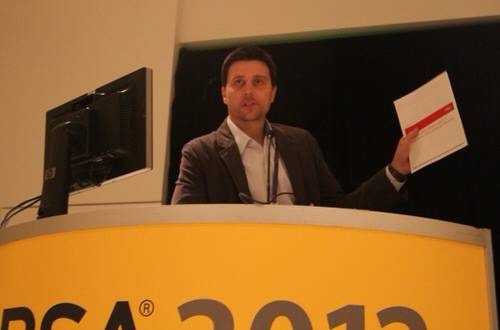In response to growing concern over comments Rush Limbaugh made last week, Netflix says they never purposefully advertised on his show. Sencha released Touch 2, which allows developers to write Android and iOS apps from either a Windows PC or a Mac. Alicia Eler wonders if passive social sharing is killing the internet. This and more in today’s Daily Wrap.

Sometimes it’s difficult to catch everything that hits tech media in a day, so we wrap up some of the most talked about stories. We give you a daily recap of what you missed in the ReadWriteWeb Community, including a link to some of the most popular discussions in our offsite communities on Twitter, Facebook, LinkedIn and Google+ as well.

Reports Raise Questions About Who Has Access To Your Facebook Profile
Rush Limbaugh’s controversial statements about college student, Sandra Fluke, are have created a significant PR firestorm for companies that run ads on his show. Netflix users have clamored for a response from Netflix PR, but they have chosen not to address these concerns in their own channels, as of this writing. They did tell ReadWriteWeb’s Joe Brockmeier that they have not knowingly purchased advertising on Limbaugh’s show, but that they do advertise on radio and two of their spots accidentally ran on the show.
The community response on the story made it clear that without a public response, they will lose some users.
From the ReadWriteWeb community:
Peg Keller — People started emailing and tweeting Netflix on Friday and Saturday and there was NO denial or any acknowledgment. John Deere it took about 15 minutes, E-Harmony the same. Netflix had their head up their a** for 4 days while the rest of the advertisers targeted at least attempted to look into what was going on.
Dan Lake — I’ve already cancelled my Netflix account as of this morning. They have until my paid time runs out in a week to change my mind. Their commercials are playing during Rush’s show and that is not in question. They can come out on Twitter or their Facebook page or however they choose to denounce this scumbag.
More Must Read Stories:

Sencha Touch 2 Allows Developers to Code iOS Apps With Windows PCs
Mobile HTML5 developer framework Sencha wants to be more than just a tool to develop hybrid mobile applications. The company’s roadmap for 2012 is to become an end-to-end solution for designing, developing and deploying HTML5 applications and is taking its first steps toward that goal today by releasing Sencha Touch 2 out of beta. Sencha Touch 2 gives developers a better user interface for developing HTML5 that will give consumers a more robust user experience. (more)

How Social Networks are Killing the Internet
Share this on Facebook! Tweet this to your followers! Pin it to Pinterest! Submit the link to StumbleUpon and drive tons of traffic to your site! Digg it and hopefully more eyeballs will see it (and then it will end up on Facebook through the Digg Social Reader). Isn’t it great? You can cross your fingers and hope that the entire social Web sees something you like if you share it to all of your social networks. After all, we are what we share. (more)

Despite Ban, Facebook Finds A Way To Grow In China
People in China may be barred from accessing Facebook, but that hasn’t stopped them from making software for the 845-million member social network.
The partnerships with Chinese software developers allow Facebook to find ways to show investors in its upcoming initial public offering growth and expansion in China, even though the Chinese government has banned access to the site since 2009. The Chinese game developers could also be a strong source of revenue growth for the recent addition of advertisements to Facebook’s mobile site. (more)

Google Play: Movies, Books, Music & Apps from Google
Google just took the wrapper off a new service called Google Play. It’s a single cloud-based media store for apps, songs, books and movies that streams between Android devices and the desktop. The Android Market and Google Music have been rolled into it. There’s lots of free streaming content available, and you can pay for the rest with Google Wallet. It’s rolling out globally starting today, but not all content is available everywhere. (more)

Sabu the Betrayer: Hacker Tweets Outrage While Conspiring With FBI
There is a code upheld by members of Sicilian mobsters called omerta. It is considered a code of honor, of value, of principal. It is the “code of silence” that means that members do not give evidence to authorities or rivals about the activities of the organization. When an organization is brought down by police there is a good chance that there was a snitch involved. Omerta was broken. (more)

Google Slashes Storage Prices: Still no GDrive
Google announced today that it’s dropping its pricing on Google Cloud Storage and its integration with several enterprise storage offerings. Google’s updated pricing scheme puts it roughly in line with Amazon’s S3, but what else does Google have to offer except a new pricing scheme?
I spoke to Google’s product manager for Cloud Storage, Navneet Joneja on Monday about the pricing change and how Google stands out in storage. (more)

AppMobi Accelerates Android HTML5 Performance With new directCanvas SDK
A lot has been made over the last couple of days of how Android renders HTML5 a lot slower than iOS. This comes as a revelation to absolutely no one. HTML5 development studio appMobi thinks it has a fix. At the Game Developers Conference today appMobi announced the availability of its directCanvas SDK for Android that promises refresh rates up to 10 times faster. (more)

How P.R. Pros Keep Their High-Profile Clients Out Of Trouble On Twitter
Seconds after one of Jai Manselle’s NBA clients accidentally tweeted out classified information about negotiations to end last fall’s lockout it was already too late to delete the 140-character message.
“It was immediately reblogged, screenshot, retweeted and disseminated heavily,” said Manselle, a public relations specialist whose firm represents clients ranging from the American Red Cross to Sean Combs. (more)

Verizon: External Security Threats Skyrocketed in 2011
The conventional wisdom has been that industrialized hacking organizations have become particularly successful with social engineering – coaxing employees into doing something stupid that unlocks their networks’ security. Analysts at the RSA Conference in San Francisco last week spoke of increasing incidents of telephone calls – actual human beings from call centers, pretending to be “Windows Security” or some other service, offering to help employees eradicate a non-existent virus from their systems and asking for their passwords outright. (more)
Keep up with ReadWriteWeb by subscribing to our RSS feed or email newsletter. You can also follow ReadWriteWeb across the web on Google+, Facebook, Twitter or LinkedIn.

















